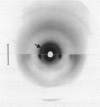Abstract
The intermolecular and interfibrillar spacings of collagen in bovine corneal stroma have been measured as a function of tissue hydration. Data were recorded from low- and high-angle x-ray diffraction patterns obtained using a high intensity synchrotron source. The most frequently occurring interfibrillar spacing varied from 34 nm in dry corneas to 76 nm at H = 5 (the hydration, H, is defined as the ratio of the weight of water to the dry weight). The most frequently occurring intermolecular Bragg spacing increased from 1.15 nm (dry) to approximately 1.60 nm at normal hydration (H approximately 3.2) and continued to increase only slowly above normal hydration. Most of the increase in the intermolecular spacing occurred between H = O and H = 1. Over this hydration range the interfibrillar and intermolecular spacings moved in tandem, which suggests that the initial water goes equally within and between the fibrils. Above H = 1 water goes preferentially between the fibrils. The results suggest that, even at normal hydration, water does not fill the interfibrillar space uniformly, and a proportion is located in another space or compartment. In dried-then-rehydrated corneas, a larger proportion of the water goes into this other compartment. In both cases, it is possible to postulate a second set or population of fibrils that are more widely and irregularly separated and therefore do not contribute significantly to the diffraction pattern.
Full text
PDF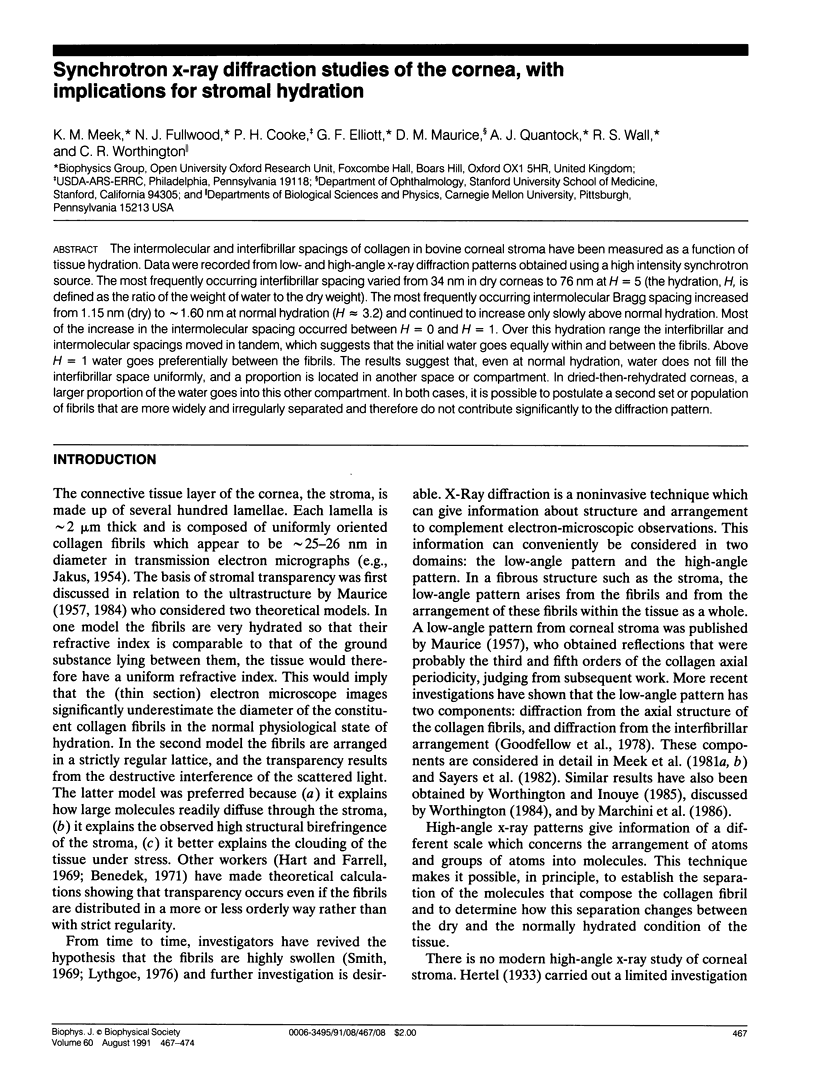
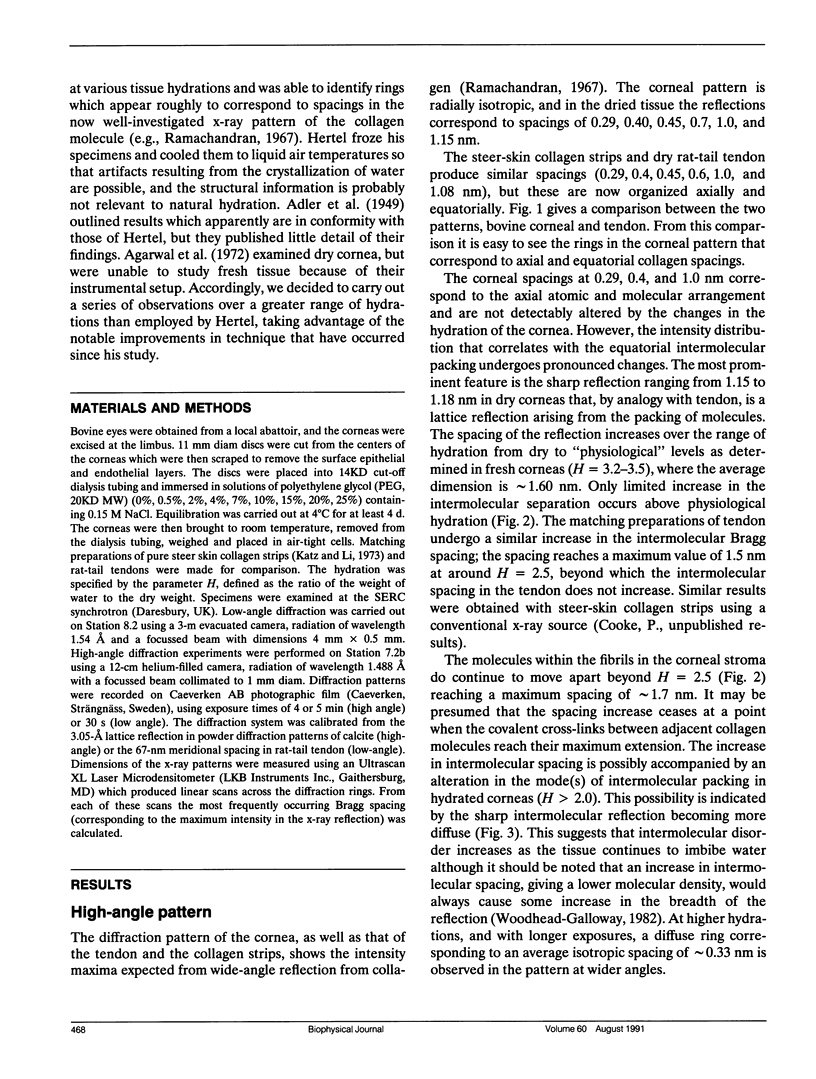
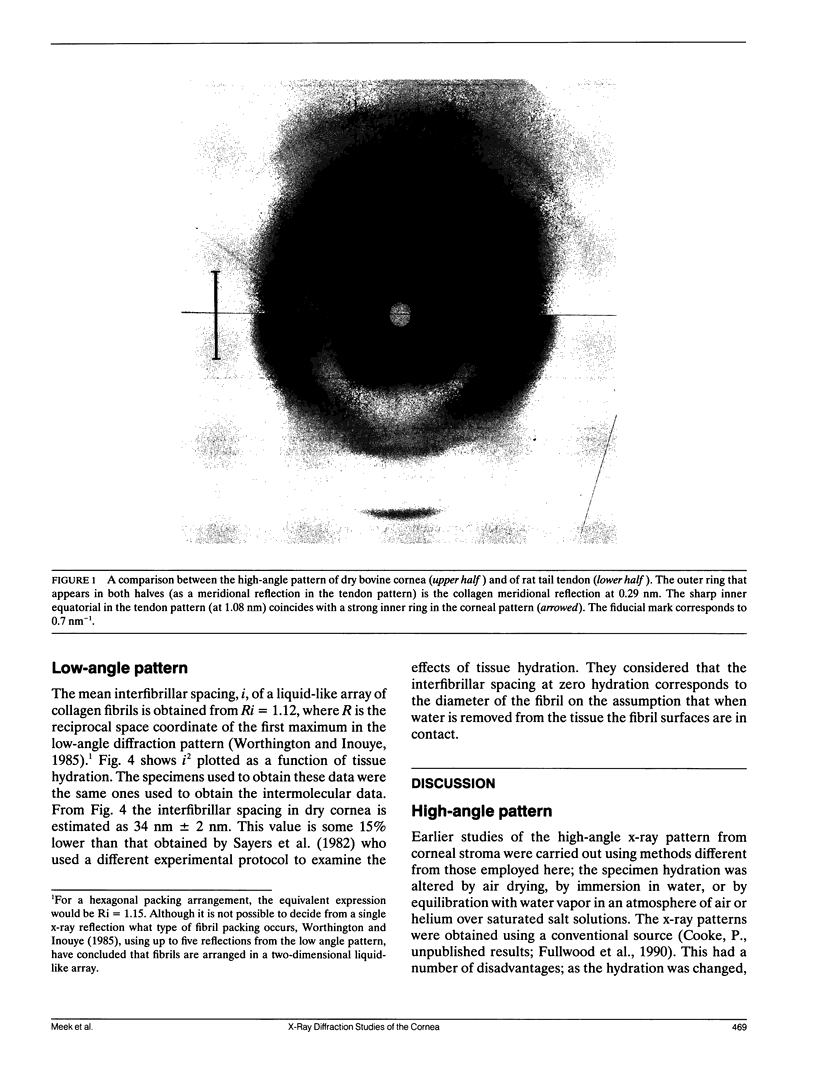
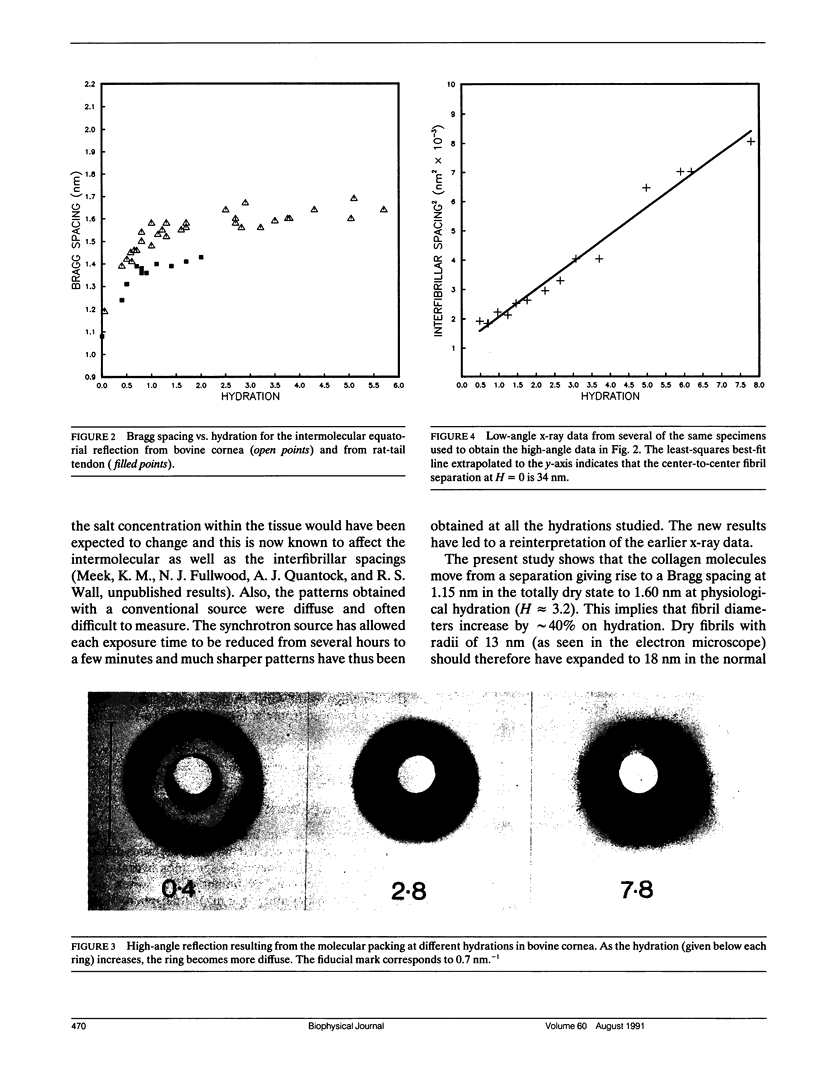
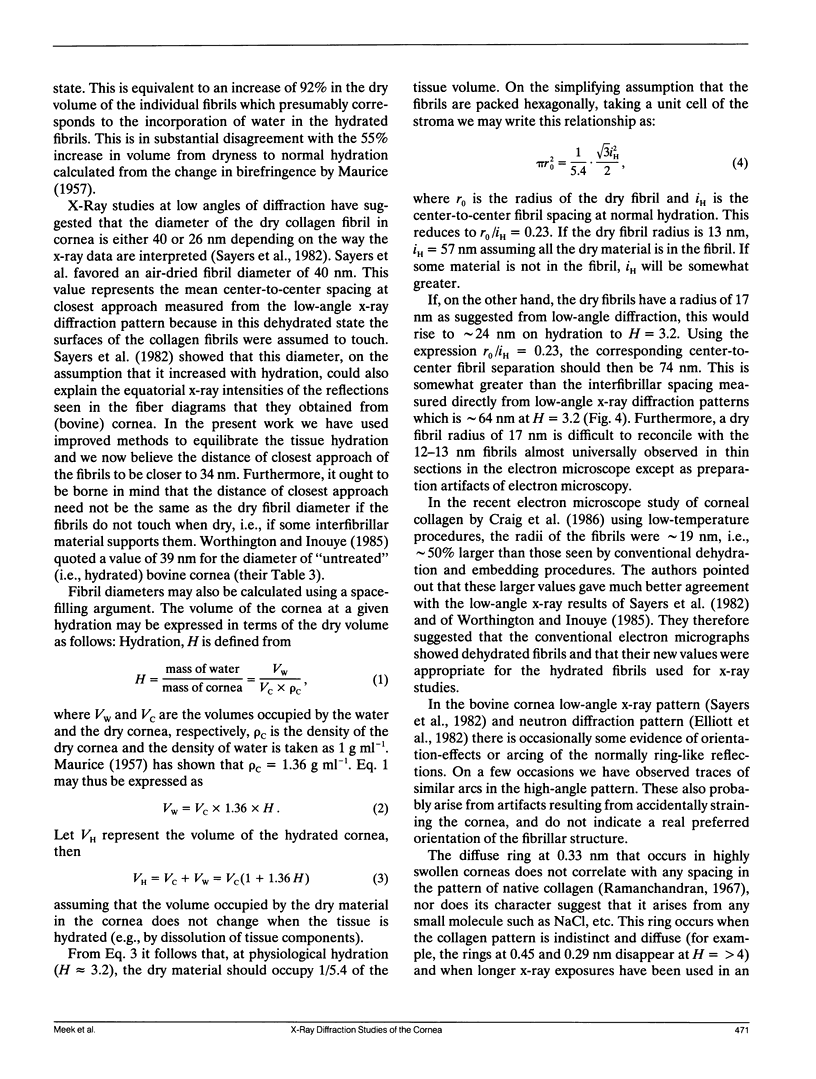
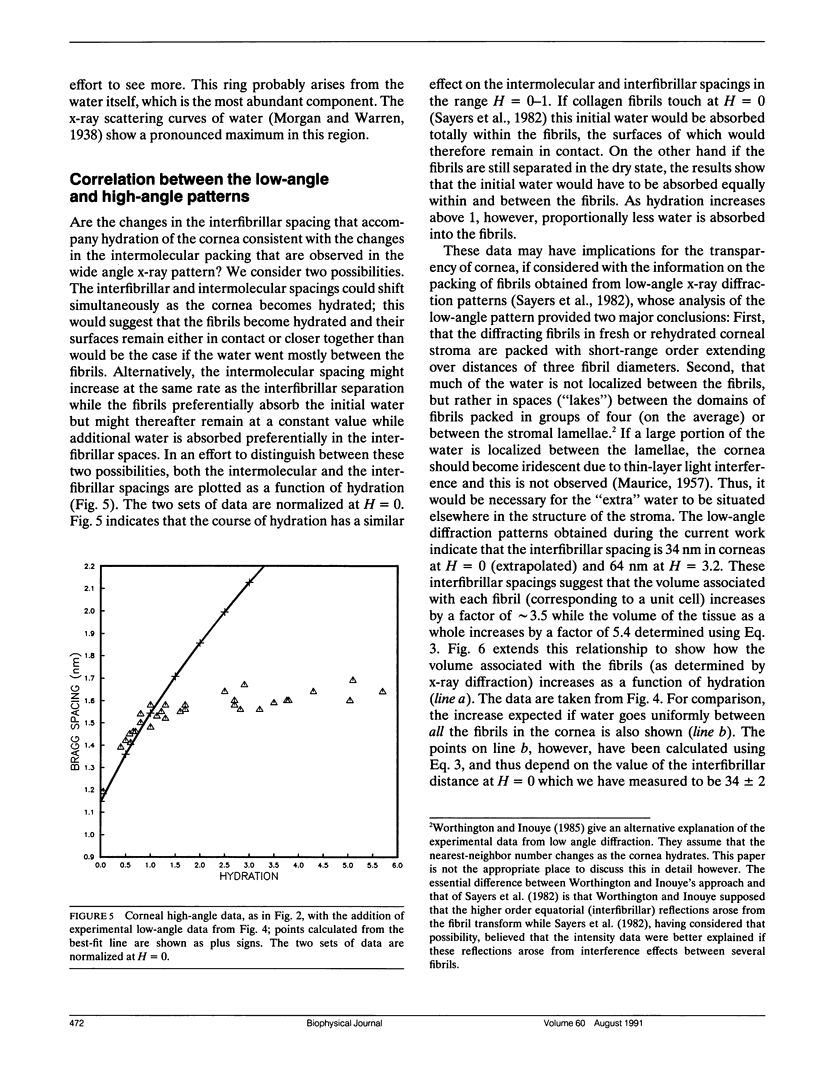
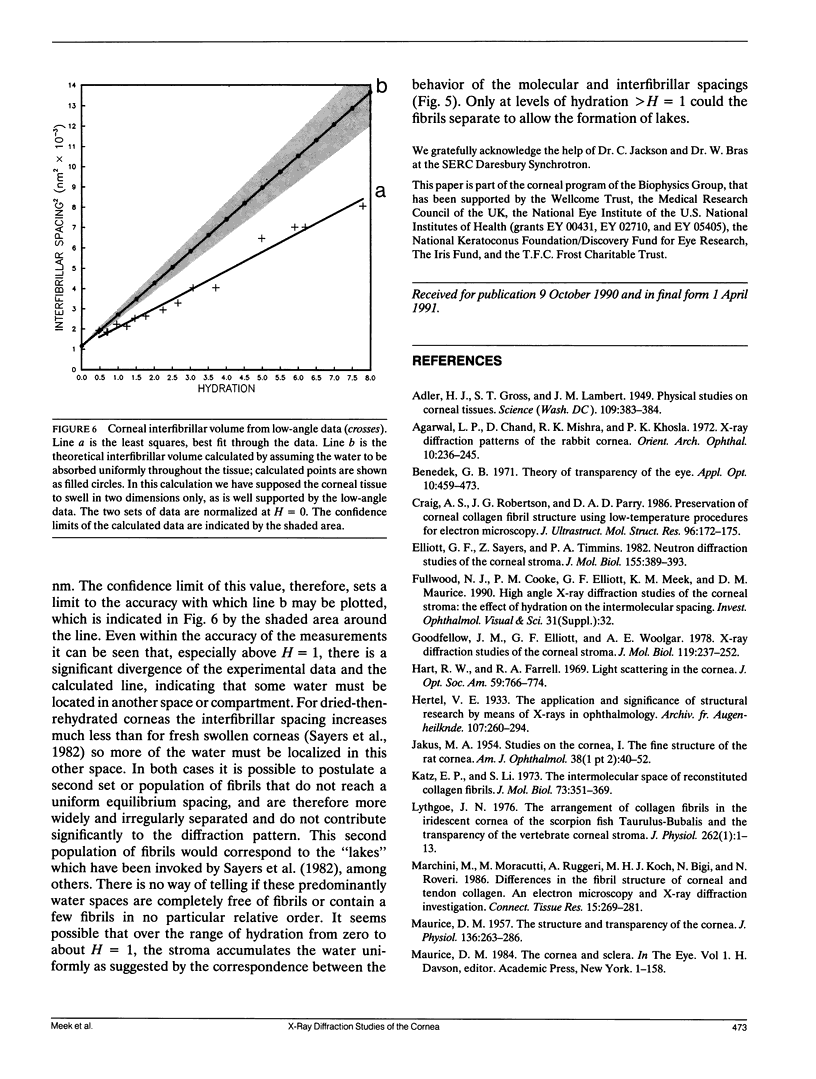
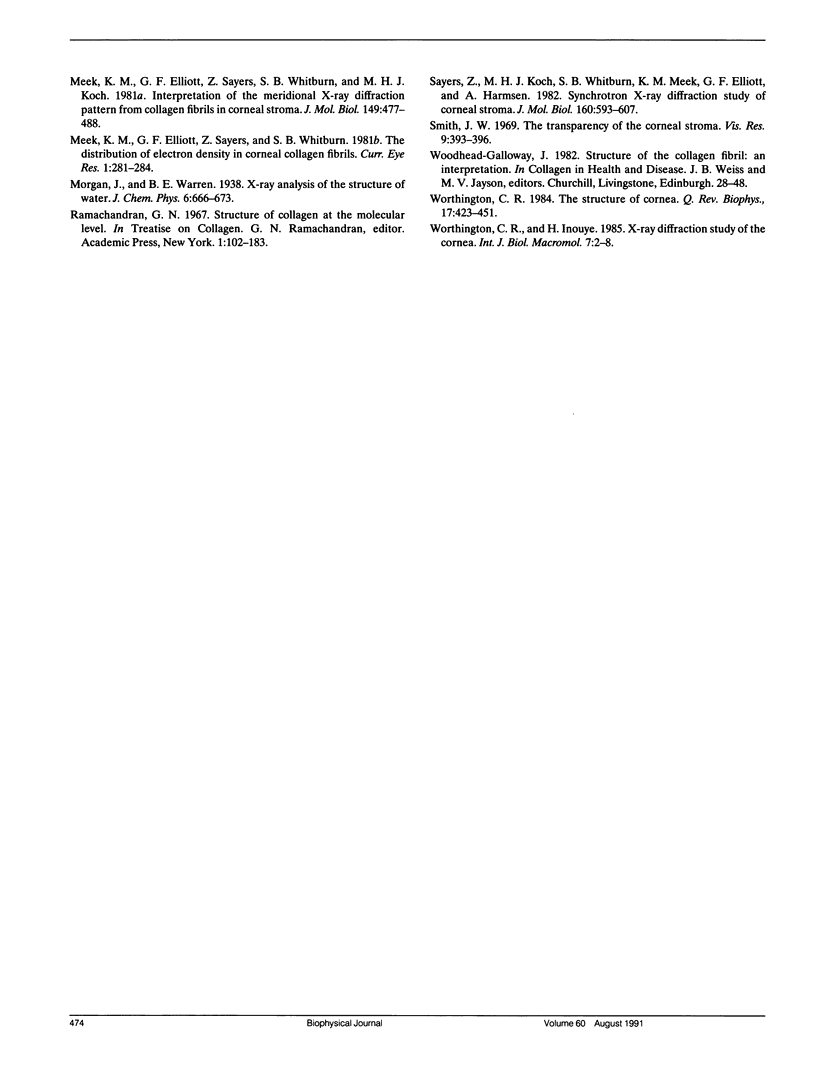
Images in this article
Selected References
These references are in PubMed. This may not be the complete list of references from this article.
- Adler H. J., Gross S. T., Lambert J. M. Physical Studies on Corneal Tissues. Science. 1949 Apr 15;109(2833):383–384. doi: 10.1126/science.109.2833.383-a. [DOI] [PubMed] [Google Scholar]
- Craig A. S., Robertson J. G., Parry D. A. Preservation of corneal collagen fibril structure using low-temperature procedures for electron microscopy. J Ultrastruct Mol Struct Res. 1986 Jul-Sep;96(1-3):172–175. doi: 10.1016/0889-1605(86)90018-2. [DOI] [PubMed] [Google Scholar]
- Elliott G. F., Sayers Z., Timmins P. A. Neutron diffraction studies of the corneal stroma. J Mol Biol. 1982 Mar 5;155(3):389–393. doi: 10.1016/0022-2836(82)90011-0. [DOI] [PubMed] [Google Scholar]
- Goodfellow J. M., Elliott G. F., Woolgar A. E. X-ray diffraction studies of the corneal stroma. J Mol Biol. 1978 Feb 25;119(2):237–252. doi: 10.1016/0022-2836(78)90436-9. [DOI] [PubMed] [Google Scholar]
- Hart R. W., Farrell R. A. Light scattering in the cornea. J Opt Soc Am. 1969 Jun;59(6):766–774. doi: 10.1364/josa.59.000766. [DOI] [PubMed] [Google Scholar]
- JAKUS M. A. Studies on the cornea. I. The fine structure of the rat cornea. Am J Ophthalmol. 1954 Jul;38(12):40–53. [PubMed] [Google Scholar]
- Katz E. P., Li S. T. The intermolecular space of reconstituted collagen fibrils. J Mol Biol. 1973 Feb 19;73(3):351–369. doi: 10.1016/0022-2836(73)90347-1. [DOI] [PubMed] [Google Scholar]
- Lythgoe J. N. The arrangement of collagen fibrils in the iridescent cornea of the scorpion fish, Taurulus (Cottus) bubalis, and the transparency of vertebrate corneal stroma. J Physiol. 1976 Oct;262(1):1–13. doi: 10.1113/jphysiol.1976.sp011582. [DOI] [PMC free article] [PubMed] [Google Scholar]
- MAURICE D. M. The structure and transparency of the cornea. J Physiol. 1957 Apr 30;136(2):263–286. doi: 10.1113/jphysiol.1957.sp005758. [DOI] [PMC free article] [PubMed] [Google Scholar]
- Marchini M., Morocutti M., Ruggeri A., Koch M. H., Bigi A., Roveri N. Differences in the fibril structure of corneal and tendon collagen. An electron microscopy and X-ray diffraction investigation. Connect Tissue Res. 1986;15(4):269–281. doi: 10.3109/03008208609001985. [DOI] [PubMed] [Google Scholar]
- Meek K. M., Elliott G. F., Sayers Z., Whitburn S. B., Koch M. H. Interpretation of the meridional x-ray diffraction pattern from collagen fibrils in corneal stroma. J Mol Biol. 1981 Jul 5;149(3):477–488. doi: 10.1016/0022-2836(81)90482-4. [DOI] [PubMed] [Google Scholar]
- Meek K. M., Elliott G. F., Sayers Z., Whitburn S. B. The distribution of electron density in corneal collagen fibrils. Curr Eye Res. 1981;1(5):281–284. doi: 10.3109/02713688108999448. [DOI] [PubMed] [Google Scholar]
- Sayers Z., Koch M. H., Whitburn S. B., Meek K. M., Elliott G. F., Harmsen A. Synchrotron x-ray diffraction study of corneal stroma. J Mol Biol. 1982 Oct 5;160(4):593–607. doi: 10.1016/0022-2836(82)90317-5. [DOI] [PubMed] [Google Scholar]
- Worthington C. R. The structure of cornea. Q Rev Biophys. 1984 Nov;17(4):423–451. doi: 10.1017/s003358350000487x. [DOI] [PubMed] [Google Scholar]



